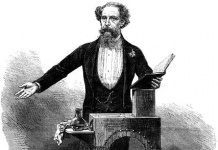 Picking up from my earlier comments on maxims and aphorisms as the ideal literary vehicles for the Twitter generation, here’s a more extended discussion of the aphorism, its virtues and value. Because it’s worth recalling in these days of hand-wringing over diminished attention spans that brevity used to be the soul of wit (as Polonius said while proving the exact opposite), and that concentration and condensation were hailed as the distinguishing marks of a distinguished mind.
Picking up from my earlier comments on maxims and aphorisms as the ideal literary vehicles for the Twitter generation, here’s a more extended discussion of the aphorism, its virtues and value. Because it’s worth recalling in these days of hand-wringing over diminished attention spans that brevity used to be the soul of wit (as Polonius said while proving the exact opposite), and that concentration and condensation were hailed as the distinguishing marks of a distinguished mind.
“Whatever happened to the aphorism?” asks Aaron Balick in his blog post on aphorisms and Twitter. “I was beginning to think it was a lost art, very much like the maxim.” Adds The Guardian: “From the days of Tacitus, brevity has been recognised as the defining characteristic of style” – not far off an aphorism in itself, though a little lacking in pith. And John Simon lists some of the vices that lead to the opposite in terms that might make you wonder about the motives of some critics of shorter attention spans. “The sound of one’s own voice, whether in talk or in writing, makes for a poor love object,” he aphorizes. And: “repetition is not the same as prolixity. The former will make you boring, but it is the latter that makes you inept. There are further possible reasons for verbosity. Greed, flattery, evasiveness, mendacity and other undesirables come to mind.” Confirms La Rochefoucauld: “As it is the mark of great minds to convey much in few words, so small minds are skilled at talking at length and saying little.”
So with all that praise for keeping it short, why not embrace the virtues of concision? Because it requires concentration? With all the money chasing social media smarts, you wonder that Facebook and Twitter hacks aren’t steeping themselves in the work of the great aphorists. Because it’s too difficult? Simon quotes Woodrow Wilson saying: “If I am to speak for ten minutes, I need a week for preparation; if fifteen minutes, three days; if half an hour, two days; if an hour, I am ready now.” But if you can, do.

































